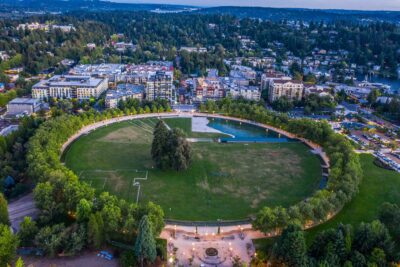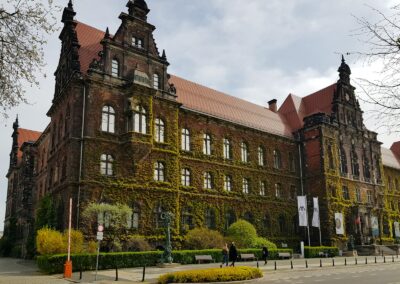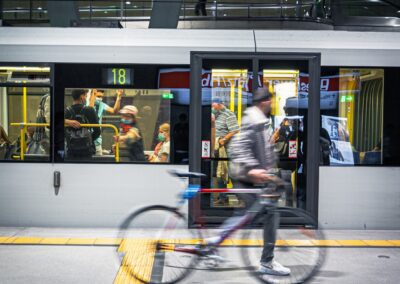How Digital Infrastructure Shapes Modern Urban Life
The Role of Technology in Shaping Smart Cities
Technology in smart cities is revolutionizing the way people experience and navigate public spaces. In pioneering regions like Saudi Arabia and the UAE, cities such as Riyadh and Dubai are leading the charge in adopting digital infrastructure to enhance urban living. Smart cities leverage advanced technologies, including Artificial Intelligence (AI), the Internet of Things (IoT), and blockchain, to create more efficient, sustainable, and user-friendly environments. For business executives, mid-level managers, and entrepreneurs, understanding how these technologies transform urban spaces is essential for harnessing their full potential and driving business success.
Smart cities integrate digital infrastructure to improve various aspects of urban life, from transportation and energy management to public safety and environmental monitoring. These technologies enable city planners to design more responsive and adaptable urban spaces that meet the evolving needs of their residents. In Riyadh and Dubai, the implementation of smart city initiatives has led to significant improvements in traffic management, waste reduction, and energy efficiency, making these cities more livable and attractive to both residents and businesses.
AI and Digital Infrastructure in Public Spaces
Enhancing Urban Navigation and User Experience
Artificial Intelligence plays a pivotal role in enhancing the functionality and user experience of public spaces in smart cities. AI-driven systems can analyze vast amounts of data from sensors and connected devices to optimize various urban functions. For instance, AI can improve traffic flow by dynamically adjusting traffic signals based on real-time conditions, reducing congestion and travel times. In cities like Riyadh and Dubai, this technology has been instrumental in creating more efficient and enjoyable urban experiences.
In addition to traffic management, AI is used in public safety and security. Intelligent surveillance systems can detect unusual activities and alert authorities to potential threats, ensuring safer public spaces. Moreover, AI-powered applications can provide personalized navigation and information services to residents and visitors, enhancing their overall experience of the city. For businesses, these improvements in urban infrastructure can lead to increased foot traffic and customer engagement, driving economic growth and success.
The Metaverse and Public Spaces
Creating Virtual Experiences in Urban Environments
The emergence of the metaverse, a virtual shared space that combines physical and digital realities, is reshaping public spaces in smart cities. In progressive regions like the UAE and Saudi Arabia, the development of the metaverse offers new opportunities for urban planning and public engagement. Virtual reality (VR) and augmented reality (AR) technologies can create immersive experiences that enhance the way people interact with their surroundings.
In smart cities, the metaverse can be used to simulate urban environments, allowing planners to test different designs and scenarios before implementation. This can lead to more effective and sustainable urban development. Additionally, the metaverse can provide residents and visitors with virtual tours and interactive experiences, making public spaces more engaging and accessible. For businesses, the metaverse opens up new avenues for marketing and customer interaction, offering unique and memorable experiences that can drive brand loyalty and growth.
Blockchain and Transparency in Smart Cities
Ensuring Secure and Transparent Urban Management
Blockchain technology is another critical component of smart cities, providing a secure and transparent framework for managing urban infrastructure and services. In cities like Riyadh and Dubai, blockchain is being used to streamline administrative processes, enhance data security, and ensure accountability in public services. This technology can create tamper-proof records of transactions and activities, fostering trust and transparency between the government and citizens.
For example, blockchain can be used in land registry systems to prevent fraud and ensure the accuracy of property records. It can also facilitate secure and efficient transactions in various sectors, including real estate, finance, and healthcare. By enhancing transparency and reducing bureaucratic inefficiencies, blockchain technology can contribute to the overall efficiency and reliability of smart city operations. For businesses, this translates into a more stable and predictable environment, encouraging investment and innovation.
Business Success in Smart Cities
Leveraging Technology for Competitive Advantage
The integration of advanced technologies in smart cities presents numerous opportunities for business success. For executives and entrepreneurs in Saudi Arabia and the UAE, staying ahead of technological trends and leveraging digital infrastructure is key to gaining a competitive advantage. Smart cities provide a conducive environment for innovation, offering businesses access to cutting-edge tools and a tech-savvy customer base.
By adopting AI, blockchain, and the metaverse, businesses can enhance their operations, improve customer experiences, and create new revenue streams. For instance, retail businesses can use AI analytics to understand customer preferences and optimize inventory management. Real estate companies can leverage blockchain for secure property transactions, and entertainment firms can create immersive experiences in the metaverse. These technological advancements not only drive business growth but also contribute to the overall economic development of smart cities.
Leadership and Management in Smart Cities
Strategies for Effective Technology Integration
Effective leadership and management are crucial for navigating the complexities of technology integration in smart cities. Business leaders in Riyadh and Dubai must develop strategic approaches to harness the potential of AI, blockchain, and the metaverse. This involves fostering a culture of innovation, investing in digital skills development, and collaborating with stakeholders across sectors.
Leaders should prioritize continuous learning and adaptability, keeping abreast of technological advancements and their implications for business and society. By adopting a forward-thinking mindset and embracing digital transformation, businesses can position themselves for long-term success in smart cities. Additionally, strong leadership in technology integration can help build resilient and sustainable urban environments, benefiting both businesses and the broader community.
Conclusion: Embracing Technology for a Smarter Future
The transformation of public spaces and urban experiences through technology in smart cities is reshaping the way people live, work, and interact. For regions like Saudi Arabia and the UAE, embracing advanced technologies such as AI, blockchain, and the metaverse is essential for creating efficient, sustainable, and vibrant urban environments. Business leaders must recognize the opportunities and challenges presented by these technological advancements and develop strategies to leverage them for competitive advantage. By fostering innovation and embracing digital infrastructure, businesses can contribute to the success and resilience of smart cities, driving economic growth and enhancing the quality of life for all residents.
—
#SmartCities #DigitalInfrastructure #PublicSpaces #AIinUrbanPlanning #ModernTechnology #BusinessSuccess #LeadershipInTechnology #UAETechnology #SaudiArabiaTechnology #RiyadhTech #DubaiTech























